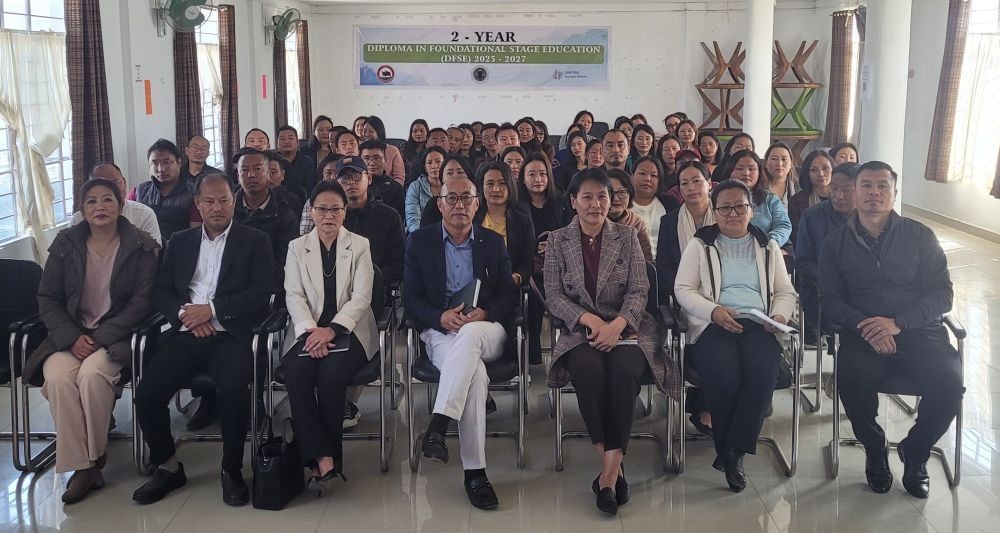Razouseyi Vese and others with trainees during the inaugural programme of 2 year Diploma in Foundational Stage Education in Kohima on March 4. (Morung Photo)

Diploma in Foundational Stage Education course in Kohima commences
Our Correspondent
Kohima | March 4
The first batch of 2 year Diploma in Foundational Stage Education (DFSE) 2025-27 under the aegis of State Council of Educational Research and Training, (SCERT), Nagaland commenced here on March 4.
Addressing the inaugural function, at SCERT conference hall, Razouseyi Vese, Director, Directorate of School Education, Nagaland, said that with the National Education Policy (NEP) 2020 in place, “we have to take care of nursery section of the students. We have to go extra mile. It will be a big challenge for us,” Vese said.
He congratulated the SCERT Nagaland for developing the training module on foundational stage education and hoped that other parts of the country will emulate the same. Learning doesn't have any limit, he said and called upon the trainees to take learning as everyday affair. The Director also called upon the teachers to impart moral values to students apart from normal textbook knowledge and curriculum.
SCERT Additional Director, Kerüüpfeü Rüpreo said that 53 Primary teacher trainees from all districts of Nagaland joined the training programme. “Many of them have already completed D.EI.Ed and B.Ed course, a few of them are fresh candidates without any professional training,” she said.
She said that New Education Policy (NEP) 2020 has envisioned a new curricular and pedagogical structure 5+3+3+4, where the first five years of schooling is the Foundational Stage for children in the age group of 3 to 8 years. This new curricular structure has necessitated for a training programme to come into place to train teachers to handle children of the Foundational Stage.
The DFSE training programme is an initiative of SCERT Nagaland, which is a two-year course for in-service primary teachers and will be transacted in blended mode, she said adding that this programme was designed with the Teacher as the primary focus as “the Teacher is at the heart of the practice of education and ultimately the torchbearer for the transformation that we seek in our education.”
While the training is envisioned to clearly define the underlying philosophy and principles of early childhood, it does not simply leave it at the level of a vague idea but also bring it to effective implementation in the classroom, she said.
The training aims to equip a strong pool of competent teachers who are responsive to the learning needs and interests of different learners in the classroom and design effective developmentally appropriate teaching-learning and assessment practices for children in the Foundational stage. On successful completing the programme, the trained teacher will become qualified to teach children at the Foundational Stage, she said.
Briefing on the two year DFSE, Roseline Richa said the reconfiguration of the curricular and pedagogical structure of school education involving a 5+3+3+4 design as recommended by NEP 2020 makes it imperative that the teacher training programmes makes available accomplished teachers with the knowledge, capacities and values and dispositions required for developing and improving the practice of teaching at a particular Stage of school education i.e., Foundational Stage, Preparatory Stage, Middle Stage or Secondary Stage.
She said the course is designed to train a pool of competent teachers capable of designing developmentally appropriate teaching-learning- assessment practices that are responsive to the learning needs and interests of children in the Foundational Stage (3 to 8 years).
Elaborating of vision of the course, Richa said, “As teachers must be at the centre of fundamental reforms in the education system, the training aims to prepare teachers as emphasised in the pedagogical and curricular restructuring of the school education under NEP 2020.” It is an effort to make teacher training relevant to the developmental needs and interest of learners in the Foundational Stage which will significantly improve quality teaching learning practices, she said.
The objective of the training is to acquaint them with the knowledge of child psychology/child development, to understand the concept and importance of developmentally appropriate practices in foundational stage and to cultivate social sensitivity, affection for children and respect for their uniqueness. It also aims to provide appropriate interventions to meet requirements of inclusive classroom and facilitate network with parents and community and government organisations and other organisations to generate awareness and seek their involvement.






